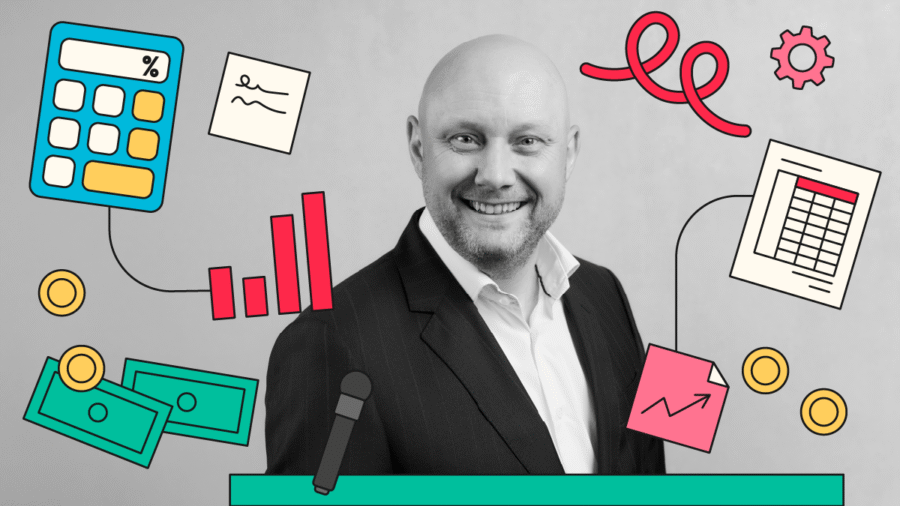
Ricoh is evolving from an office-equipment company to a digital-services provider, and Tim Stuart, the CFO of its European operations, is helping to guide the transformation. Stuart joined Ricoh in 2016 on a temporary contract as the group financial controller but was elevated to the CFO role less than two years later. During his time at the organisation, his responsibilities have expanded well beyond the finance function to include everything from procurement to legal.
Here, he explains how a short-term assignment turned into a long-term leadership journey and shares insights on managing a global business transformation and the power of continuous learning.
How did you become a CFO?
I joined Ricoh a little more than nine years ago to cover the group financial controller role while the job holder was on maternity leave. Within 18 months, the finance chief at the time took a position as chief operations officer and I stepped into the CFO role.
Initially, I was responsible for a few functions, including finance, tax and treasury. Over time, that expanded to include supply chain, procurement, legal, transformation and HR. Today, I work across a broad set of functions and teams in multiple countries. It’s a busy role and very much a fully developed CFO position now.
What skills does a good finance leader need?
One of the most important skills is being able to translate complex technical information into messages everyone can comprehend. I get loads of financial data, spreadsheets and reports, and I need to turn all of that into a coherent, clear message for non-finance people. I’ve got to be able to tell them how the business is performing in a way they understand.
You also need to be highly analytical and able to spot where there’s an error or an opportunity in the numbers. Beyond that, working across functions such as HR, IT and sales is essential. Everyone must understand how their actions impact profit and loss.
Lastly, the modern CFO must be a strategic business partners to their CEO. I spend a lot of time with the CEO, looking at acquisitions or transformation projects, for instance. My job is to bring both financial knowledge and strategic insight to the table.
What excites you most about your current role?
Definitely the variety. No two days are ever the same. Even with a full schedule, things often shift and that keeps the work interesting. One of the most exciting parts has been our transformation into a digital-services company, moving beyond our legacy business in photocopiers and printers. I’ve been involved in 18 acquisitions over the past seven or eight years, and those have been significant in that transformation journey.
I also really enjoy working with people across Europe and Japan. Every country has its own way of doing things. Japan, in particular, has a very distinct business culture. Learning to adapt and build relationships there has required effort and patience, but it’s been one of the most rewarding aspects of my role.
What’s the biggest challenge facing your sector at the moment?
The biggest challenge is competition. In our traditional business of printers and copiers, we face strong rivals such as Canon and Konica Minolta. At the same time, we are expanding into digital services, which means competing with companies such as Fujitsu, IBM and Microsoft. We’re juggling two different levels of competition across our business.
Still, this shift brings opportunity. Instead of just selling a product, we focus on solving problems for our customers. That might mean offering a mix of hardware and digital services, all as part of one Ricoh solution.
What single thing would make your job easier?
The audit regulatory environment has become much more demanding over the past five or six years. As a result, my team has had to take on significantly more work. Audit fees across Europe have doubled, which adds to the pressure. And, since we’re part of a Japanese-listed group, we go through quarterly reviews in addition to the year-end audit. It’s relentless. Auditors provide a valuable service, but if I had to name one thing that would make my job easier, it would be not having them.
What is the best bit of business advice you’ve ever received?
A book I always return to is The 15 Commitments of Conscious Leadership by Jim Dethmer, Diana Chapman and Kaley Warner Klemp. I received it during a leadership course at Ricoh and it stuck with me. The book focuses on how your actions as a leader affect others. It covers themes including curiosity, appreciation and emotional awareness. There’s a handful of commitments that resonate each time I refer back to it.
What do you do outside of work to protect yourself from burnout?
I love walking with my wife. I work in the city but live in the countryside, so once I’m off the train, I’m surrounded by nature. I enjoy playing golf because of the social aspect. I love to travel and learn about different cultures. Being active and getting outdoors helps me stay balanced.
What’s your proudest achievement in your current role?
It might sound odd, but my proudest achievement is managing a major change in our audit provider. Our parent company in Japan switched auditors globally. That, combined with new regulatory requirements, made managing the transition incredibly tough. The new auditors didn’t know our business and asked a long list of questions to learn about us.
I has been in the CFO role for only two years and there was a lot of pressure. But, after months of planning and teamwork, we completed a clean year-end audit with no material adjustments. My CEO was happy. My global CFO was happy. The global CEO was happy. So I was like, ‘That’s it – the job’s done.’
If you weren’t a CFO, what would you like to do?
I’ve always said I never got far through the alphabet when choosing a career. I started at A, for accountant. But if I weren’t a CFO, I’d be an architect. Another career starting with the letter A. I love floor plans, new builds and designing spaces.

Ricoh is evolving from an office-equipment company to a digital-services provider, and Tim Stuart, the CFO of its European operations, is helping to guide the transformation. Stuart joined Ricoh in 2016 on a temporary contract as the group financial controller but was elevated to the CFO role less than two years later. During his time at the organisation, his responsibilities have expanded well beyond the finance function to include everything from procurement to legal.
Here, he explains how a short-term assignment turned into a long-term leadership journey and shares insights on managing a global business transformation and the power of continuous learning.





